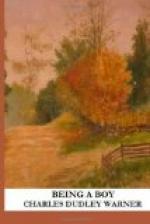The boy is not always slow to take what he considers his rights. Speaking of those thin pumpkin-pies kept in the cellar cupboard. I used to know a boy, who afterwards grew to be a selectman, and brushed his hair straight up like General Jackson, and went to the legislature, where he always voted against every measure that was proposed, in the most honest manner, and got the reputation of being the “watch-dog of the treasury.” Rats in the cellar were nothing to be compared to this boy for destructiveness in pies. He used to go down whenever he could make an excuse, to get apples for the family, or draw a mug of cider for his dear old grandfather (who was a famous story-teller about the Revolutionary War, and would no doubt have been wounded in battle if he had not been as prudent as he was patriotic), and come upstairs with a tallow candle in one hand and the apples or cider in the other, looking as innocent and as unconscious as if he had never done anything in his life except deny himself butter for the sake of the heathen. And yet this boy would have buttoned under his jacket an entire round pumpkin-pie. And the pie was so well made and so dry that it was not injured in the least, and it never hurt the boy’s clothes a bit more than if it had been inside of him instead of outside; and this boy would retire to a secluded place and eat it with another boy, being never suspected because he was not in the cellar long enough to eat a pie, and he never appeared to have one about him. But he did something worse than this. When his mother saw that pie after pie departed, she told the family that she suspected the hired man; and the boy never said a word, which was the meanest kind of lying. That hired man was probably regarded with suspicion by the family to the end of his days, and if he had been accused of robbing, they would have believed him guilty.
I shouldn’t wonder if that selectman occasionally has remorse now about that pie; dreams, perhaps, that it is buttoned up under his jacket and sticking to him like a breastplate; that it lies upon his stomach like a round and red-hot nightmare, eating into his vitals. Perhaps not. It is difficult to say exactly what was the sin of stealing that kind of pie, especially if the one who stole it ate it. It could have been used for the game of pitching quoits, and a pair of them would have made very fair wheels for the dog-cart. And yet it is probably as wrong to steal a thin pie as a thick one; and it made no difference because it was easy to steal this sort. Easy stealing is no better than easy lying, where detection of the lie is difficult. The boy who steals his mother’s pies has no right to be surprised when some other boy steals his watermelons. Stealing is like charity in one respect,—it is apt to begin at home.
X
FIRST EXPERIENCE OF THE WORLD
If I were forced to be a boy, and a boy in the country,—the best kind of boy to be in the summer,—I would be about ten years of age. As soon as I got any older, I would quit it. The trouble with a boy is, that just as he begins to enjoy himself he is too old, and has to be set to doing something else. If a country boy were wise, he would stay at just that age when he could enjoy himself most, and have the least expected of him in the way of work.




